 LOTR Tarot - Hobbits
LOTR Tarot - Hobbits
 LOTR Tarot - Hobbits
LOTR Tarot - Hobbits
| Home | Natural Family Living | Big Life Issues | Animal- Human- Angel |
Culture of Love | Solar Culture | Spirituality | Emotion |
Contact Bruce About PWP Links Photo Credits:- All images are scans of Tarot cards crafted by Bruce Mitchell from many sources |
Lord of the Rings (LOTR) Tarot - Hobbits Hobbits were small, unobtrusive humanoids. They were a hole-dwelling, burrowing people with a lifespan of 100 years. They were said to be related to Men, about half their size (2-4 feet; 61cm-1.22m), and smaller than Dwarves. They were possessed of a well-fed and cheerful countenance. They were long-fingered, had curly brown hair upon their heads and peculiar shoeless, oversized feet. They were an unassuming, conservative people. They judged their peers by their conformity to quiet Hobbit village life. Excessive behaviour or adventurous endeavour were discouraged and considered indiscreet. The excesses of Hobbits were limited to dressing in bright colours and consuming six substantial meals a day. Their one eccentricity was the art of smoking pipe-weed, which they claimed as their one contribution to world culture. By nature, Hobbits had peace-loving temperaments. They lived in the northwest of Middle-earth, in Bree (village settled by Men) and in the Shire (settled by Hobbits and isolated from the rest of Middle-earth). By great luck they discovered the Shire, a land as peaceful as it was fertile. Although Hobbits were comfort-loving, provincial and distrustful of the outside world, in times of danger they were courageous, skilful and relatively undaunted by great terrors (unlike other races). The Tarot suit of Cups and its element Water are evident in Hobbit conviviality, peaceful temperaments and connection with the fertile land. Ace 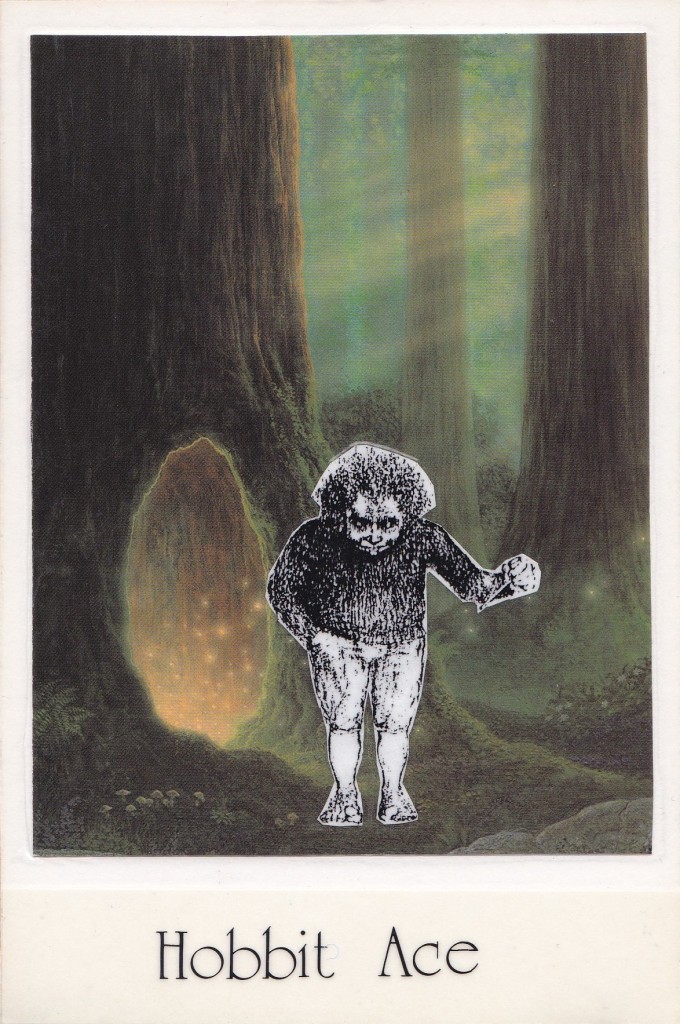 It is claimed that in the same Age as the awakening of Men, the Hobbits also arose in the East. The Hobbit on this card could be Marcho or Blanco, who led the Hobbits to the Shire, and were the first Hobbits to be mentioned by name in Middle-earth's history. Or perhaps it is Bucca of the Marish, first Thain of the Shire. 2 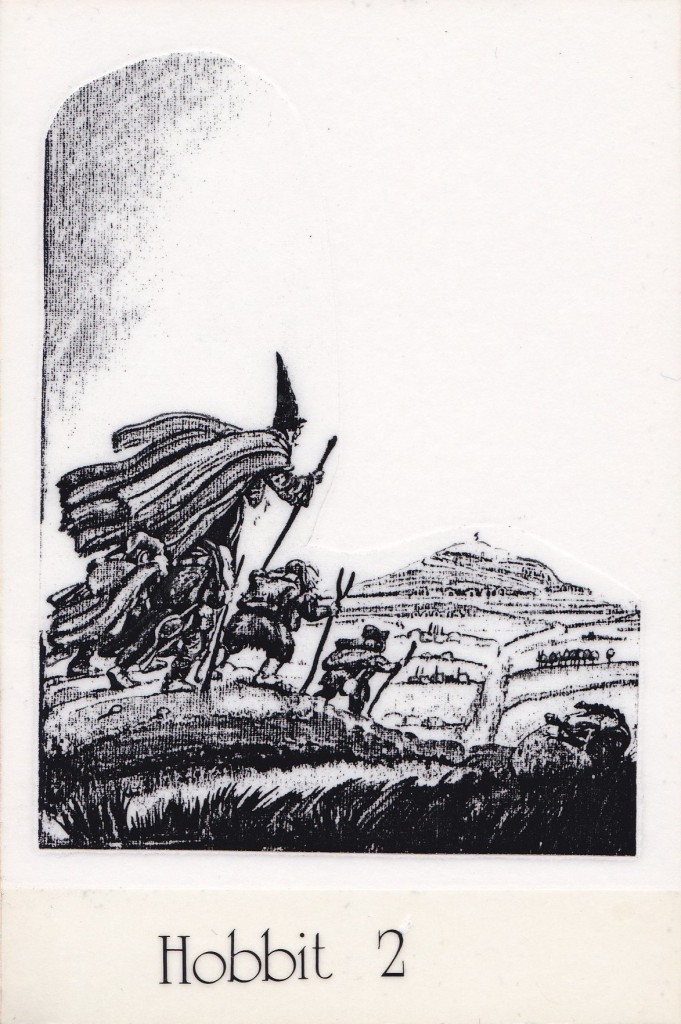 From The Hobbit, the prequel to LOTR, this is the Company of Adventurers entering the Hobbit lands of the Shire. They seek to compel Bilbo Baggins to join them as their thief. The card's meaning is partnership and commitment. 3 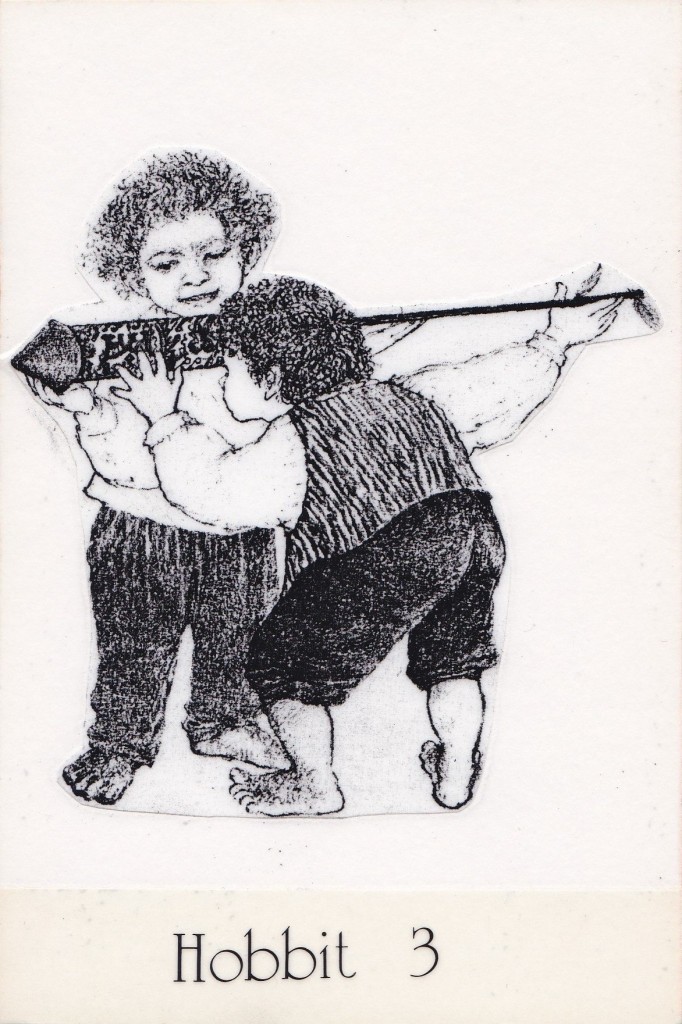 This is the Farewell Party or Feast held in the Shire to celebrate the eleventy-first [111] birthday of Bilbo and the coming of age [33] of Frodo. The Party was quite spectacular with 144 guests, huge amounts of food, fireworks by Gandalf and presents from as far away as Erebor. The card shows two young Hobbits inspecting one of Gandalf's fireworks and generally having fun. The card's meaning is celebration and renewal. 4 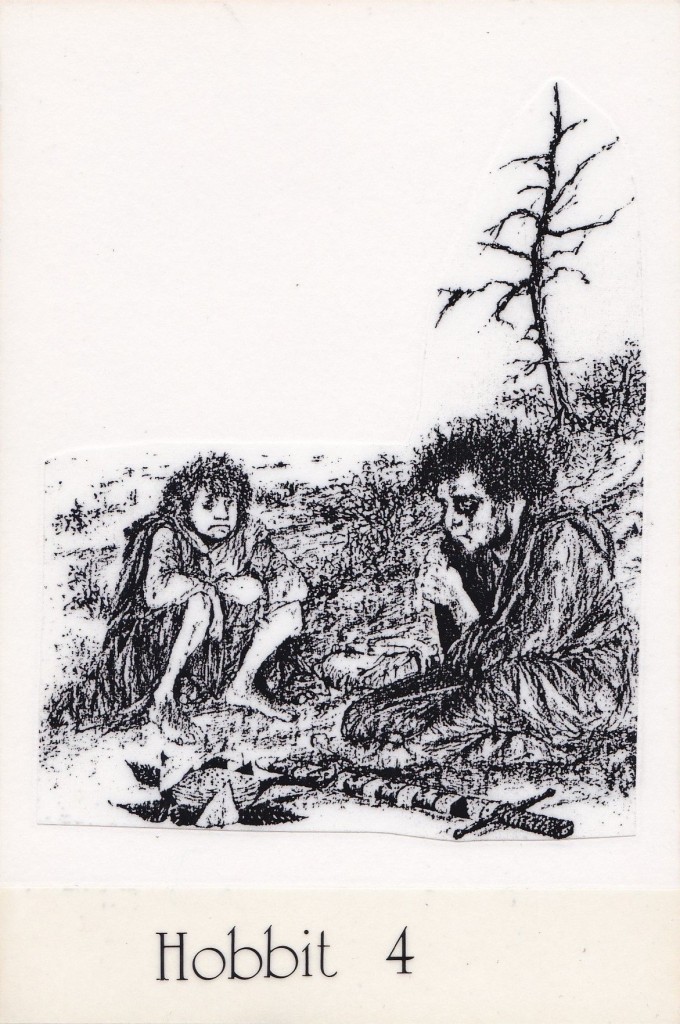 Frodo the Ring-bearer and Samwise Gamgee are in a wilderness on their Quest to Mount Doom to destroy the One Ring. Encumbered by their trials and responsibilities, they appear fatigued, dejected and discouraged. The card's meaning is stagnation of the spirit, boredom, depression, dissatisfaction, and a time for emotional re-evaluation. 5  Gollum, originally a Hobbit called Sméagol, was corrupted by the One Ring, both mentally and physically. He sought long to recover his "precious" from Bilbo then Frodo. Shortly after the Company of the Ring was broken (see Man 6), Frodo and Samwise 'tamed' Gollum and constrained him to guide them through the Dead Marshes. The card's meaning is 'something lost and something gained'. So, from Gollum's point of view, he has lost the Ring, but now has a great opportunity to steal it back. Another episode with Gollum where the card's meaning is apparent is the critical moment at the Crack of Doom. Just as Frodo succumbs to the power of the Ring and claims it for himself, the treacherous Gollum bites the Ring off Frodo's finger but falls backwards into the Fire of Doom. From Frodo's and Middle-earth's position, the Ring has been plundered by Gollum (something lost) but the World has been saved from domination by evil (something gained). 6 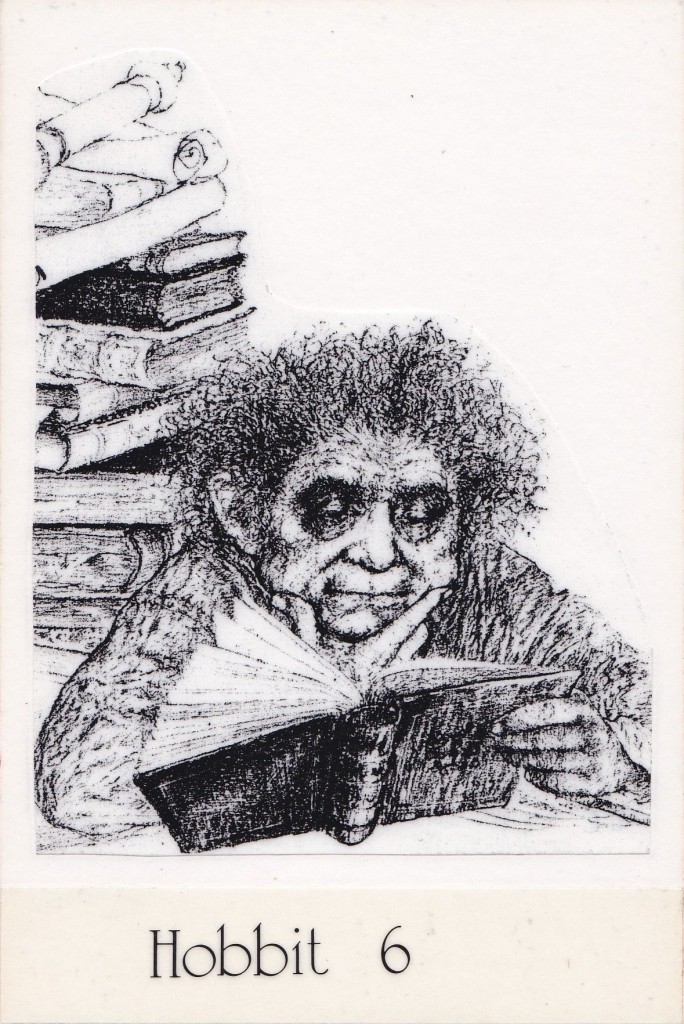 Bilbo Baggins recorded his adventures in The Hobbit. Here he is rereading his account. Perhaps The Red Book of Westmarch and other Elven literature are stacked behind him, awaiting him. Is he happy recalling the old times or wishing he had the One Ring again? The card's meaning is: nostalgia, past influences that have vanished, happy memories. 7 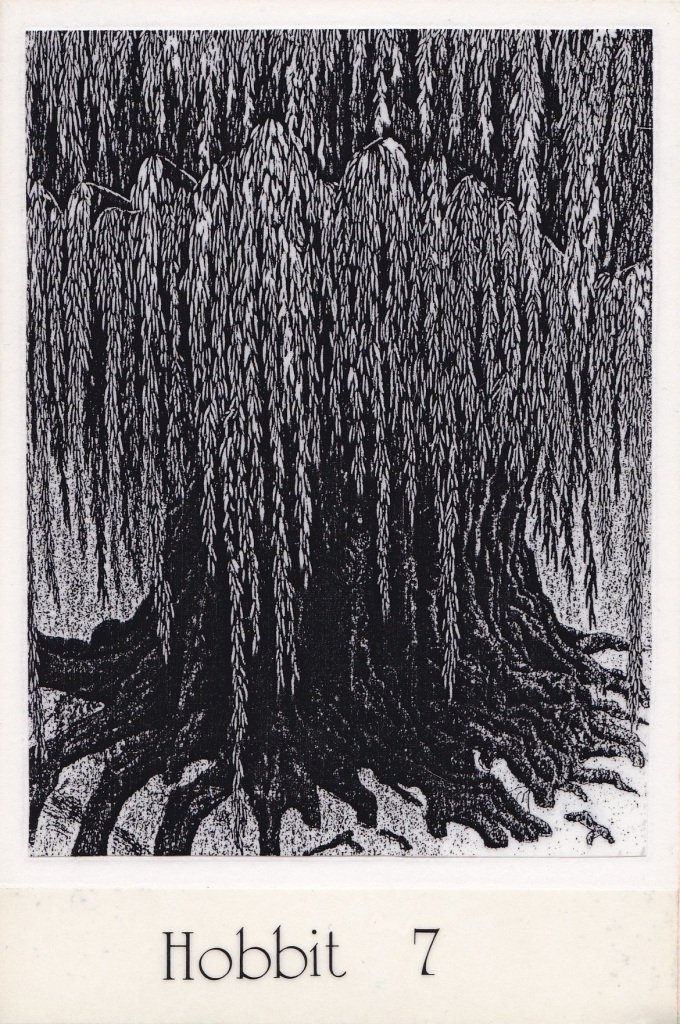 Old Man Willow was an old, hoary, inviting-looking willow tree in the Old Forest. Near the start of the LOTR, the four Hobbits felt they had to paddle in the refreshing water next to it, settle down against it and fall asleep. But all was not as it seems. The tree was actually evil-hearted, had lulled them into drowsiness, and began to devour them. They were only saved by Tom Bombadil, who had power over it. The card's meaning is 'all that glitters is not gold'. 8 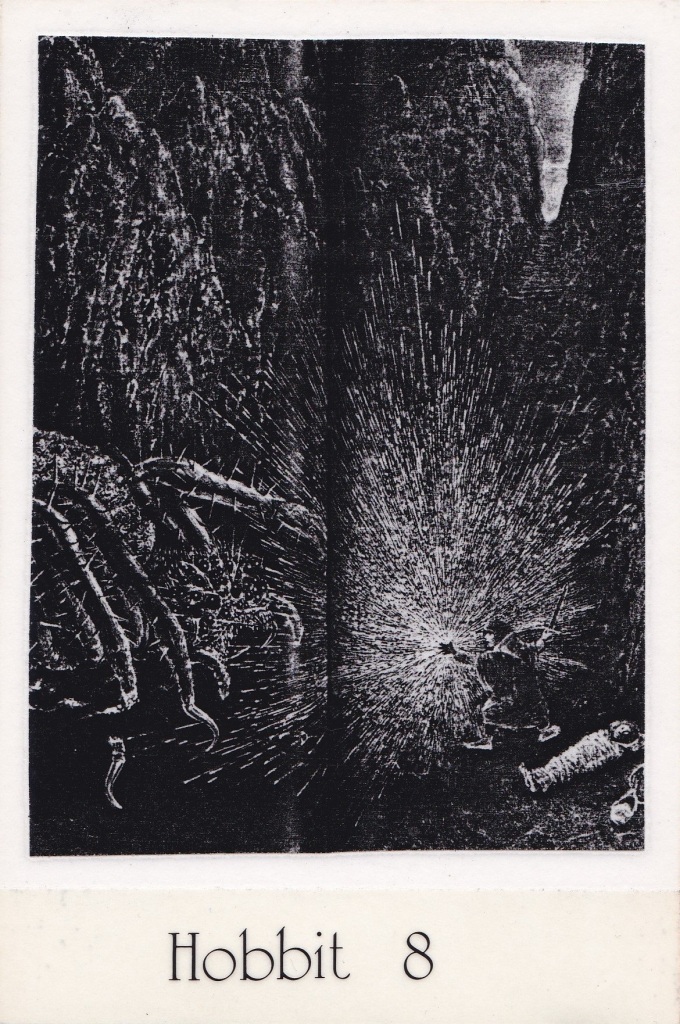 This is the wounding of the demonic spider Shelob by Samwise Gamgee. 'Shelob the Great' had already struck down, paralysed and cocooned Frodo for later consumption. Samwise brought the Quest of Mount Doom alive again after using Frodo's magical blade 'Sting' and the powerful spiritual Light from the Phial of Galadriel. The spider impaled itself on Sting and was nearly blinded by the starlight, whereupon she fled. Samwise thought Frodo dead. He had to fight against his beliefs that he was of little worth, that only Frodo could be the Ring-bearer, that Samwise could continue the Quest. Only later, after overcoming these inner obstacles, did he overhear Orcs saying Frodo was still alive. The card's meanings, apparent in this ordeal, include: disappointment, resignation, modesty, moving away, abandonment of previous plans. 9 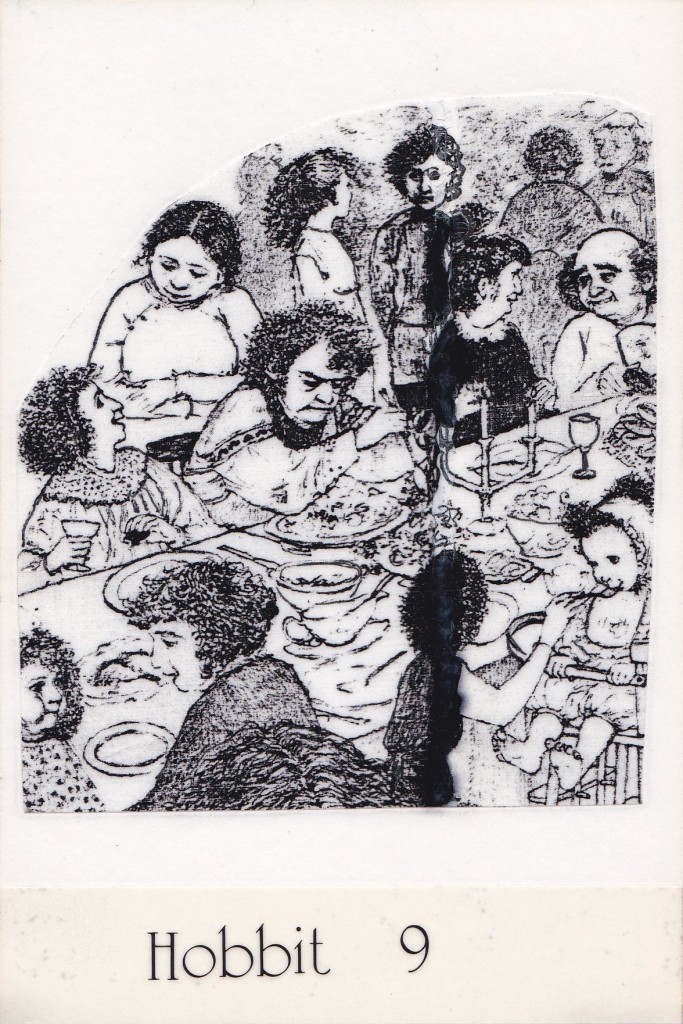 This is a Hobbit banquet, full of warmth, laughter, fun and contentment. The card's meaning is fulfilment and well-being. This is a more material and physical well-being than the spiritual happiness of Hobbit 10. 10 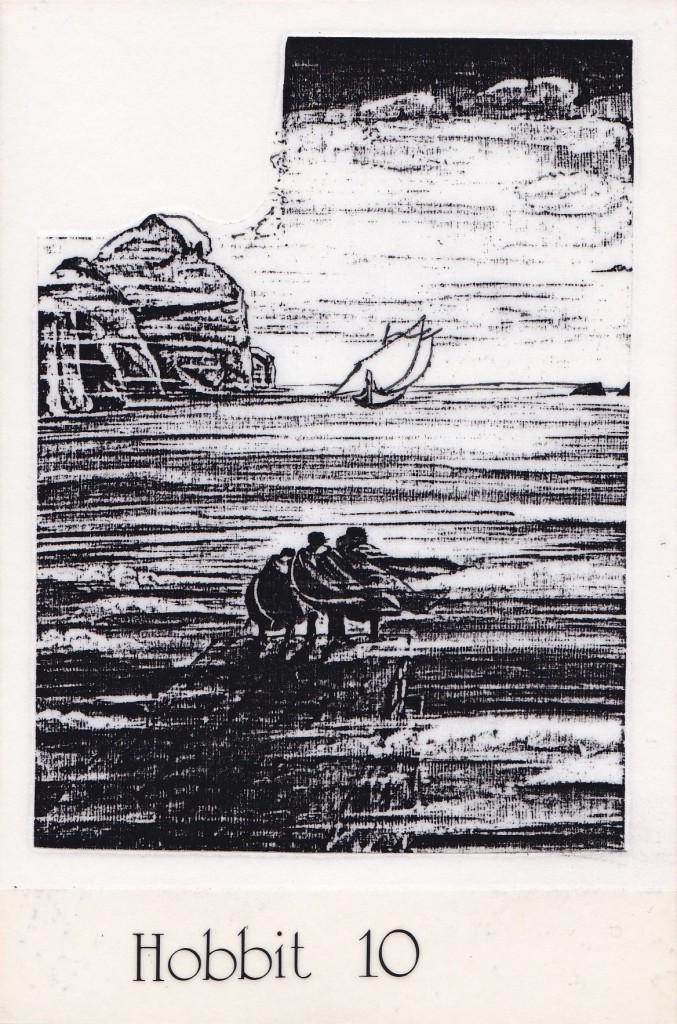 After the War of the Ring, we see the departure of the Ringbearers (Elrond, Galadriel, Gandalf, Bilbo and Frodo) for the Undying Lands. The card suggests lasting spiritual happiness (compare with Hobbit 9). Page 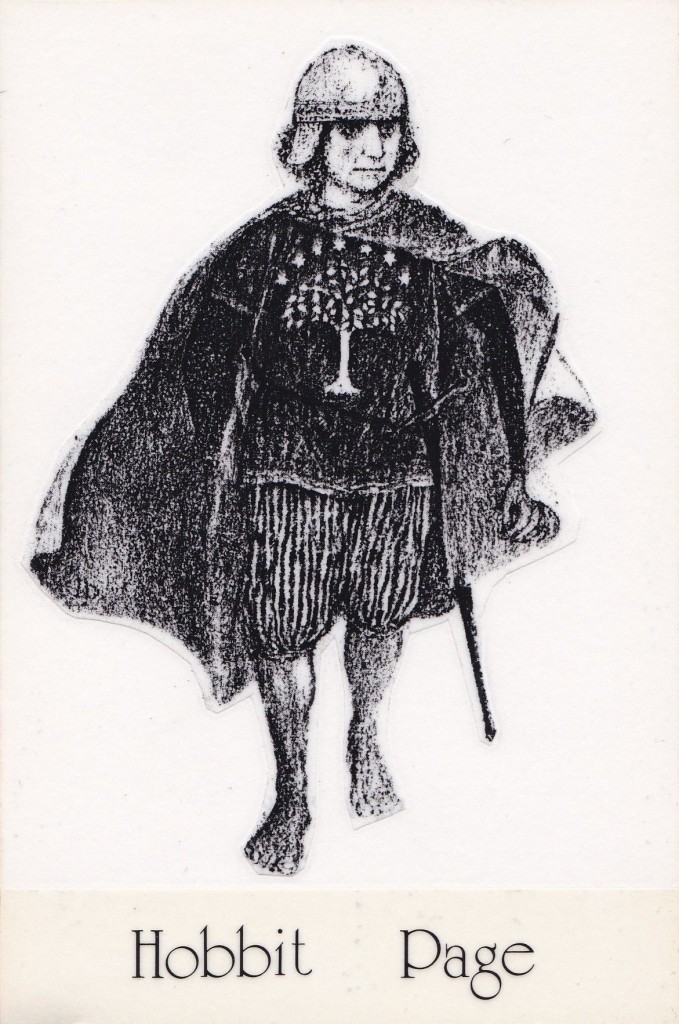 Pippin, also called Peregrin Took, was extremely curious by nature. He was friend and cousin of Merry (Hobbit Knight). He became an adventurer and one of the Companions of the Ring. Later in the LOTR, Denethor, the Steward of Gondor, accepted Pippin's request to be a Guard of the Citadel of Minas Tirith. Subsequently, Pippin saved Denethor's son Faramir from suicide and even slew a troll officer at the Battle of the Black Gate. He was knighted by King Elessar (Aragorn) and significantly helped Merry defeat Saruman's forces during the scouring of the Shire. Knight 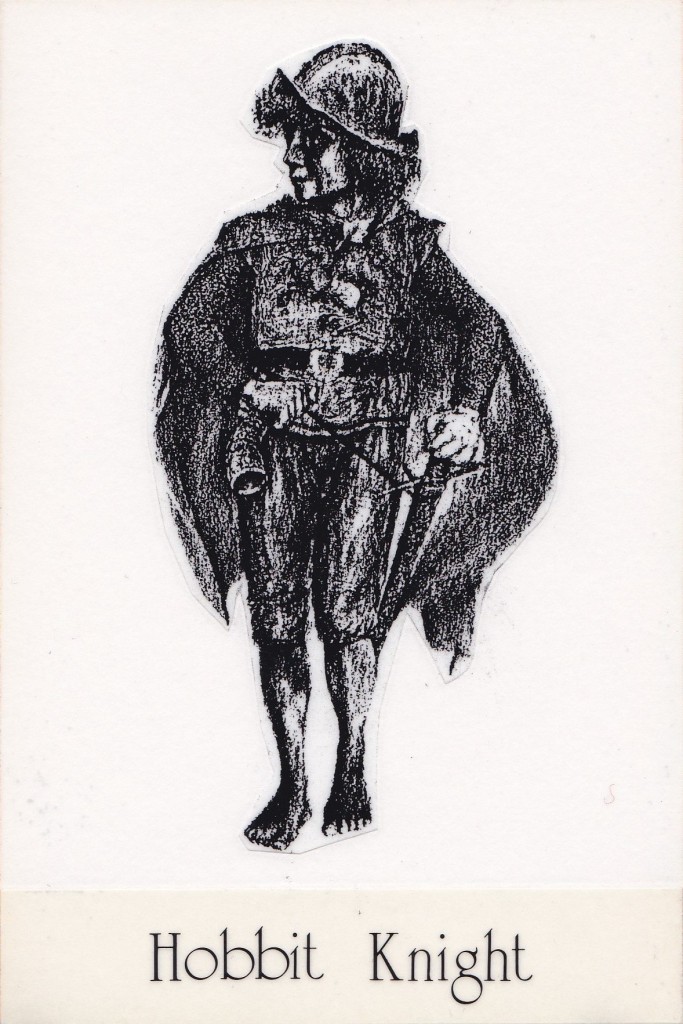 Merry, also called Meriadoc Brandybuck, became an adventurer and one of the Companions of the Ring. He was friend and cousin of Pippin (Hobbit Page). He swore fealty to King Théoden of Rohan and was his esquire. During the epic Battle of Pelennor Fields, he assisted Éowyn in slaying the Nazgûl Lord. For this great deed he was knighted by King Éomer as a Knight of the Mark. Later, during the scouring of the Shire, he was effectively the commander of the Hobbit forces. He also wrote certain Hobbitish scholarly works. Queen 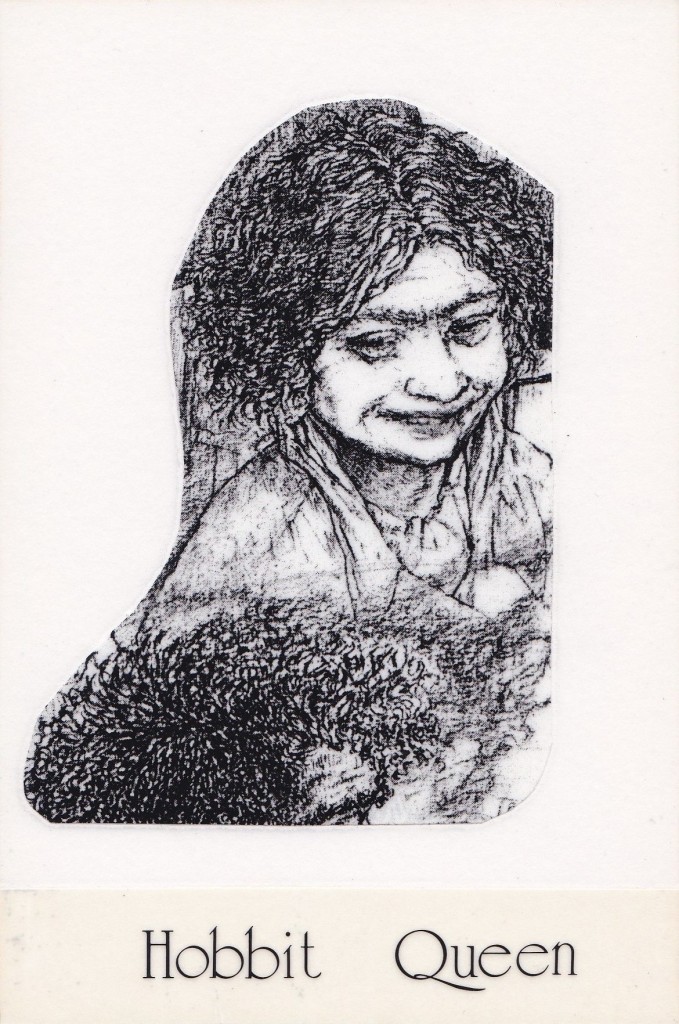 There were no kings or queens in the Shire, only Thains (military leaders). So, perhaps this is Rose, wife of Samwise Gamgee. Previously she was known as Rosie Cotton and Mistress Rose. After the War of the Ring, she bore him a record 13 children. Or Pippin's wife Diamond "of Long Cleeve" Took. Or, as Merry was Thain during the scouring of the Shire, it may be his wife Estella Bolger. Or if the Queen is to be mature (as per Tarot design), perhaps this is Merry's mother Esmeralda Brandybuck. King 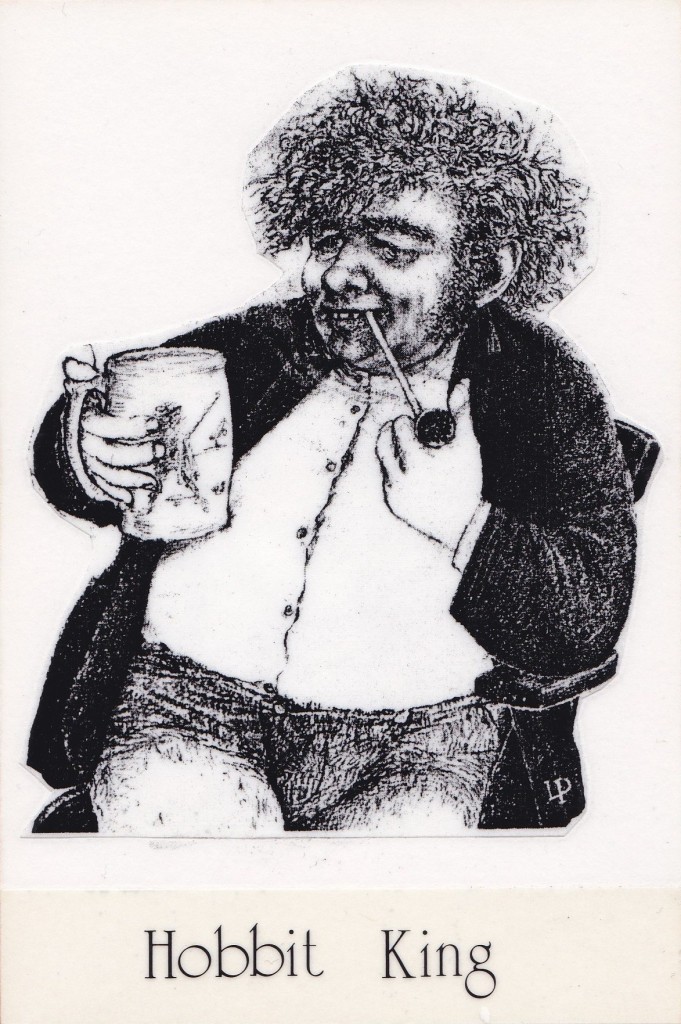 Bilbo Baggins. In The Hobbit, Bilbo was hired as a burglar. Through his many exciting adventures and by unknowingly bearing the One Ring, he became experienced and wise. He was also translator and writer. Bilbo was effectively uncle to Frodo. |
Also see:- LOTR Tarot by Bruce Mitchell Tarot Biblical Tarot by Bruce Mitchell Maps of Consciousness articles |
| Top of Page | Contact Bruce |